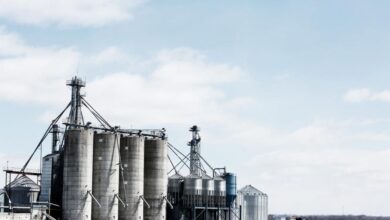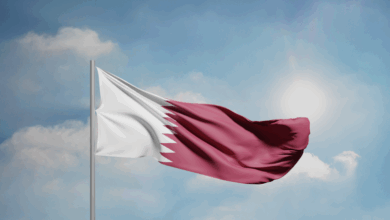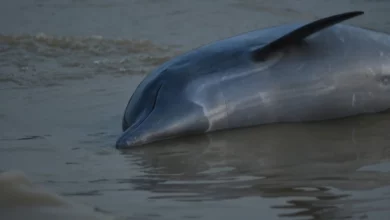Plans to build a British Petroleum (BP) onshore gas processing plant in Idku, a town east of Alexandria and a hub for oil and gas companies, has raised concerns among local residents about its potential environmental impact.
Speak to Al-Masry Al-Youm in Idku, residents involved in the campaign said they are calling for the Egyptian Environmental Affairs Agency (EEAA) to conduct a full study to determine what the impact will be, particularly as current plans are to locate it close to and between the sea shore and a residential area.
“We want the environmental agency to be the arbitrator between us and BP,” said Mostafa Darwish Koz, the head of Idku’s trade union for petroleum workers.
Raafat al-Beltagy, vice chairman for field development at the state-owned Egyptian Natural Gas Holding Company (EGAS), who has been closely involved with the project, declared that a full EEAA report will be complete within two to three months.
So far, the project has received approval from the military and initial approval from the EEAA to replace the soil, but not to install any equipment.
The purpose of the BP plant is to bring the gas that is produced offshore via pipeline to an onshore site that can then be used to deliver natural gas supplies.
BP has discovered 5 trillion cubic feet of gas at its North Alexandria offshore concession and plans to start producing 900 to 1000 million standard cubic feet of gas per day by the third quarter of 2014, which is equivalent to 20 percent of Egypt’s gas demand.
Beltagy explained that the site’s location was chosen because it is the shortest distance from the offshore field and does not cross existing pipelines by Rashid
Petroleum Company (Rahspetco), which has been producing gas in the area for some time.
Rashpetco is a joint venture between the UK’s BG Group, Italian power company Edison, and the state-owned Egyptian General Petroleum Company (EGPC).
A tainted history
Local fears are heightened because of the town’s negative history with petroleum company operations. According to documents obtained by Al-Masry Al-Youm, studies conducted in 2006 by the EEAA found that industrial waste dumping in the Mediterranean Sea by Rashpetco and Burullus Gas Company was illegal.
Burullus is a joint venture between BG, EGPC and Malaysia’s Petroleum Nasional Berhad (Petronas).
Water samples taken from Rasheptco’s industrial waste show that the level of certain chemicals, including nitrogen and chemical oxygen demand, was above Egypt’s permitted levels.
Residents say this caused the loss of sea life and killed agricultural lands, which consequently also had an impact on fishermen and farmers’ loss of trade. Beltagy denies there is evidence that fish died as a consequence of waste-dumping.
Rashpetco’s waste is now dumped in an EEAA-designated site in the Western Desert on the Cairo-to-Alexandria road.
Beltagy said Rashpetco and the Egyptian Liquefied Natural Gas Company (ELNG) have committed, since then, to investing US$650,000 per year in local development projects. ELNG is also a joint venture between BG, Petronas, EGPC, Egas and Gaz de France International.
BP has also committed to spending a total of LE100 million (US$16.75 million) on Idku’s development, Beltagy added. This includes creating a high-standard beach area, and updating fishermen’s boats so that they are motorized.
Indeed, there is a sense among many, but not all, of Idku’s residents that the gas companies are there to steal Egypt’s resources for the benefit of the West. The town does not have a sense of having benefited from these investments, and a visit to Idku did indeed show that the town is under-developed.
Idku’s anti-BP campaign
A Facebook page in Arabic called “The Campaign of Idku town’s families against British Petroleum” was set up at the beginning of September to raise awareness of local concerns. The page, however, does not list an administrator and attempts to communicate with those posting videos were not met with any responses.
According to the videos, and conversations with locals in Idku, their main message is that the people are not against investments that are beneficial to Egypt, but in this case they have not experienced much benefit.
Emad Ahmed Zeytoun, a lawyer and member of the campaign, told Al-Masry Al-Youm that their additional demands include: greater employment of locals by petroleum companies in the area, promises that those involved in Rasheptco and existing gas companies in Idku would not be involved in the BP project, and compensation to fishermen and farmers.
Local campaigners have organized conferences and protests, which have included a sit-in at the proposed BP site, blocking the highway road and raiding BP’s Idku office. They have met with the governor of Beheira and other officials, as well as submitting a legal complaint to the military council and Egyptian navy, but say that none of their demands have been met so far.
Numerous references are made in the videos on Facebook to BP’s 2010 Gulf of Mexico oil spill disaster, and the fear of something similar happening in Idku.
Disputed land use
Locals are disputing the legality of the land use of the BP project site, saying that it should be used for tourism instead, and that the land in fact belongs to Idku’s families. Beltagy, however, says the land is owned by the government.
He said that the proposed site for onshore gas processing was initially chosen by the North Alamein Petroleum Company (NAPC), of which he was chairman, when it was exploring for gas in the area. But NAPC, which is joint venture between EGPC and US energy company Hess, did not find enough gas for production.
At the time, the land was under the authority of the Tourism Ministry and they gave the permission in 2009 for the land to be used for industrial development, instead of tourism. Al-Masry Al-Youm has a copy of the 2009 decision, which was passed by former president Hosni Mubarak.
This, however, appears to contradict a 2002 EEAA report, also obtained by Al-Masry Al-Youm, which concludes that Idku is an ecologically-rich area. Based on this, the agency at the time would not give permission to build a petrochemicals complex, also between the town’s sea shore and residential area. The company proposing to build this complex is not named.
Reasons given for refusing the project include its impact on agricultural land, especially Idku’s numerous palm tree groves, coral reefs, and fish. The project would also obstruct the migration route of birds that stop at Idku’s lake.
The report concludes that Idku is better suited as an area to be promoted for environmental tourism. It says the complex should find an alternative location on desert land away from the residential area and sensitive nature zones.
BP and BG are among the largest foreign investors in Egypt. Attempts by this journalist to speak with BP at their offices in Cairo were refused. BG was not available for comment at the time of going to press.




